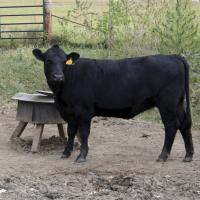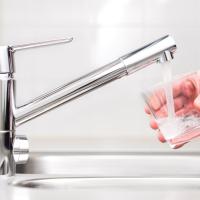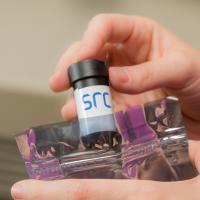SRC Environmental Analytical Laboratories provides testing packages for home and cottage owners, acreages and farms. Testing the water at your residence provides valuable information about the safety and quality of your water.
SRC has over 60 years of experience with air, water and soil testing and analysis. We are a trusted Canadian laboratory for communities, government, consultants and industry, and we are conveniently located in Saskatoon, Saskatchewan. We are accredited to ISO/IEC 17025 standards and have a comprehensive quality control and quality assurance program.
Order a Test
If you have any questions about your water or would like to order a sample kit, please email us or phone 306-933-6932.
Working with SRC, you'll benefit from:
- No extra costs for sampling supplies, storage or disposal
- Fast turnaround times
- Direct contact with lab supervisors
- Quality results from a Canadian-owned and operated lab
Residential Services Guide
Download our Residential Services Guide
Well Water Potability
To ensure drinking water taken from well water (groundwater) sources is safe for human consumption, the water should be tested for potability on a regular basis. SRC’s Well Water Potability Package includes tests for Total coliform bacteria, E. Coli and Nitrates. The presence of coliform bacteria indicates the water is not safe for human consumption. The Canadian Guidelines for Drinking Water Quality specifies a maximum acceptable concentration of 45 mg/L for nitrates in drinking water.
Routine testing and maintenance of your well will help identify and prevent problems, enabling you to ensure the safety of your drinking water on an ongoing basis.
Learn more about our bacteria tests, which are ideal for hot tubs and pools.
- Includes Total Coliform, E.Coli, Nitrates
- CA$85.00 + GST
- Includes Total Coliform, E.Coli
- CA$55.00 + GST
Water Quality Assessment for Treatment Needs
Well water contains naturally occurring minerals, such as calcium, magnesium, sodium, potassium, chloride, sulfate, iron and manganese. Although these minerals are not hazardous to human health, they can affect water quality when present in high concentrations, resulting in hard water scaling, odour, colour and taste. Testing for these components will help determine the right treatment solution.
- Includes Calcium, Magnesium, Sodium, Potassium, Chloride, Sulfate, pH, Specific conductivity, Nitrate, Alkalinity, Bicarbonate, Carbonate, Total Hardness, Iron, Manganese, Hydroxide, Sum of Ions
- CA$157.00 + GST
- Includes Calcium, Magnesium, Sodium, Potassium, Chloride, Sulfate, pH, Specific conductivity, Nitrate, Alkalinity, Bicarbonate, Carbonate, Hydroxide, Sum of ions, Total Hardness, Full ICP-MS metal scan (includes iron, manganese, lead in drinking water, heavy metals and other trace elements), Total Dissolved Solids, Fluoride, Silicon, Total Organic Carbon, Free Carbon Dioxide
- CA$446.00 + GST
Additional Water Testing for Treatment Needs
Tannins may enter the water supply through the process of vegetable matter degradation. This will cause the water to be amber in colour.
The primary reasons for reducing organic carbon in drinking water are not related to the toxicity of the organic carbon compounds, but to reduce the formation of trihalomethanes (THMs) following chlorination and to avoid the objectionable colour that arises when humic and fulvic acids are present at high levels.
- CA$129.00 + GST
- CA$56.00 + GST
Lead and Other Contaminants in water
Leaching from plumbing (e.g., pipes, solder, brass fittings and lead service lines) can lead to elevated lead and copper concentrations in drinking water. Arsenic and uranium may be present in elevated levels from naturally occurring sources, such as erosion and weathering of rocks and soils. The Canadian Guidelines for Drinking Water Quality specify maximum acceptable concentrations for lead (0.010 mg/L), arsenic (0.010 mg/L) and uranium (0.020 mg/L)
- CA$111.00 + GST
Visit our Lead in Drinking Water webpage for more information.
- Full trace metal scan plus lead in drinking water
- CA$268.00 + GST
Irrigation and Greenhouse Applications
Two major factors to consider when determining if water is suitable for irrigation or greenhouse use are salinity and the Sodium Adsorption Ratio (SAR). A plant’s salt sensitivity is a function of many conditions, including salt type, soil conditions, water quality and climate. High SAR levels (meaning excess sodium relative to calcium and magnesium) can negatively impact soil structure by dispersing clay aggregates, which reduces soil permeability and aeration.
- Includes Calcium, Magnesium, Sodium, Potassium, Chloride, Sulfate, pH, Specific conductivity, SAR, Total dissolved solids, Nitrate, Alkalinity, Bicarbonate, Carbonate, Total Hardness, Hydroxide, Sum of Ions, Boron, Copper, Phosphorus, Zinc, Iron, Manganese
- CA$244.00 + GST
Surface Water Quality for LiveStock
View our livestock water testing page for more information.
Sulfate
Sulfate in livestock water should not exceed 1,000 mg/L. Higher concentrations of sulfate can be tolerated, but loss in production should be anticipated. High levels of sulfate can cause diarrhea in young animals.
Salinity (Total Dissolved Solids)
The concentration of total dissolved solids (TDS) in water used for livestock should not exceed 3,000 mg/L. Water with higher TDS concentrations can be used, but the type of livestock and their age must be considered.
- Includes Sulfate/Salinity
- Suitable for assessing common concerns in water used for livestock
- CA$85.00 + GST
- Includes Calcium, Magnesium, Sodium, Potassium, Chloride, Sulfate, Sum of ions, pH, Specific conductivity, Nitrate, Alkalinity, Bicarbonate, Carbonate, Hydroxide, Total Hardness, Total Dissolved Solids, Fluoride
- Suitable for assessing overall quality in water used for livestock
- CA$157.00 + GST
- Includes ICP-MS Metal Scan, Mercury
- Suitable for identifying potential contaminants in water for livestock
- CA$218.00 + GST
- Includes Phenoxy Herbicides, Pesticides and Neutral Herbicides
- Suitable for identifying contamination of pesticides and herbicides in water used for livestock
- CA$668.00 + GST
Spray Water Suitability
Some surface and well water may not be suitable to mix fungicides, herbicides and pesticides for use in sprayers. Unsuitable water can decrease the effectiveness of the chemical and cause plugging problems during application.
- Includes Calcium, Magnesium, Sodium, Potassium, Sum of Cations, pH, Specific conductivity, Alkalinity, Bicarbonate, Carbonate, Hydroxide, Total Hardness, Total Dissolved Solids, Iron
- CA$184.00 + GST
Interested in ordering a water test kit? Please email us or phone 306-933-6932.
Frequently Asked QueSTIONS
The first step is to decide what you want your water tested for. Refer to our Residential Service Guide for a list of common tests.
Once you identify what tests you want performed, you can pick up the appropriate sampling supplies from our lab at 143-111 Research Drive in Saskatoon or call 1-800-240-8808 or email us and we can arrange to ship the supplies to you.
It depends on what you want your water tested for. For instance, bacteria analysis requires a sterile container. Any bottle provided by the client cannot be guaranteed to be sterile, so the lab test cannot distinguish whether the water contains the bacteria or if the container itself was contaminated.
Other labs may perform testing differently than SRC and their bottles and/or preservatives may not be appropriate for testing at SRC. Our lab may not be able to perform the tests you require with bottles other than our own.
It is always best to obtain the appropriate bottles from our lab before taking your sample. Call 1-800-240-8808 or email us and we’ll send you sampling supplies.
Rashes can be caused by a range of issues, which may or may not be related to your water. Consult a medical professional to determine if a specific pathogen(s) or contaminant(s) is the source of your rash.
If water testing is required, call 1-800-240-8808 or email us for instructions and sampling supplies.
We recommend testing your well water at least annually for potability. Shallow wells are more prone to contamination and should be tested more frequently.
Testing is also recommended in unusual events or situations, such as heavy rains, flooding or after a drought.
If you are considering purchasing a new home or have added a well to your property, you should consider testing your well to ensure the water is safe for use.
Well water used at cabins or cottages should be routinely tested for potability. Shallow sand-point wells that are often used at cabins are readily susceptible to contamination.
Similarly, if lake water is used directly, bacterial contamination of the water is expected. In these cases, an additional treatment system to help ensure the safety of the drinking water is necessary. Ongoing maintenance of the treatment system, as recommended by supplier/manufacturer, along with routine (at least annual) testing of the treated water is recommended to ensure the treatment system remains effective.
Our Greenhouse Package provides a number of parameters that can be used to assess the suitability of water for irrigation, including concentrations of various plant nutrients and micro-nutrients.
Our Spray Water Suitability package provides a number of parameters that can be used to assess if a water is suitable to use for dilution and application of fertilizers or herbicides in a mechanical sprayer.
View our Residential Services Guide for more information or call 1-800-240-8808 or email us and we can provide a quote, instructions and sampling supplies.
Sampling for radon in water requires special containers and an appropriate sample handling process. Please contact us at 1-800-240-8808 or email us to obtain the necessary sampling supplies and detailed sampling instructions.
Well water can become contaminated with sulfur-reducing bacteria that can ultimately lead to the presence of hydrogen sulfide gas, which has a distinctive rotten egg smell.
Shock chlorination of the well is often an effective treatment to control or eliminate the bacteria and associated odour. View our Well Water Testing Packages in our Resident Service Guide and call 1-800-240-8808 or email us for instructions and sampling supplies.
Although we cannot recommend a system, we can help you with the baseline testing used by system suppliers to determine which system would be best suit your needs.
View the Water Quality Packages in our Residential Service Guide and call 1-800-240-8808 or email us for instructions and sampling supplies.
It is best to test the water at the point of use.
- If you are using the water from the water taps inside your residence, you would test this water.
- If the water is being pumped directly from the well for such use as irrigation or livestock watering, you would test this water. Testing both the well water and point of use water can indicate if the treatment system is functioning appropriately.
Call 1-800-240-8808 or email us and we can provide instructions and sampling supplies.
Numerous parameters can impact the safe, recreational use of various surface waters. The Guidelines for Canadian Recreational Water Quality published by Health Canada provide a good overview of this topic.
Specific regulations related to recreational water quality fall under provincial jurisdiction. Saskatchewan has published Surface Water Quality Objectives that list limits for various parameters for Recreation and Aesthetics.
If you’d like to test your water to be sure it’s safe for use, call 1-800-240-8808 or email us for instructions and sampling supplies.
Health Canada has developed a specific sampling and testing procedure for lead in drinking water, so stop by our lab at 143-111 Research Drive in Saskatoon and pick up the appropriate sampling supplies. We will provide you with instructions on how to take the sample.
If you do not live in or near Saskatoon, call 1-800-240-8808 or email us and we will arrange to ship the supplies to you.
Sometimes the anode used in a hot water heater will increase sulfate levels in the water, supporting the growth of sulfate-reducing bacteria, especially in a hot water environment.
Replacing the anode may be necessary along with cleaning and flushing the hot water tank.
If you’d like to test your water to be sure it’s safe for use, call 1-800-240-8808 or email us for instructions and sampling supplies.
If you have any questions about your water or would like to order a sample kit, please email us or phone 306-933-6932.



